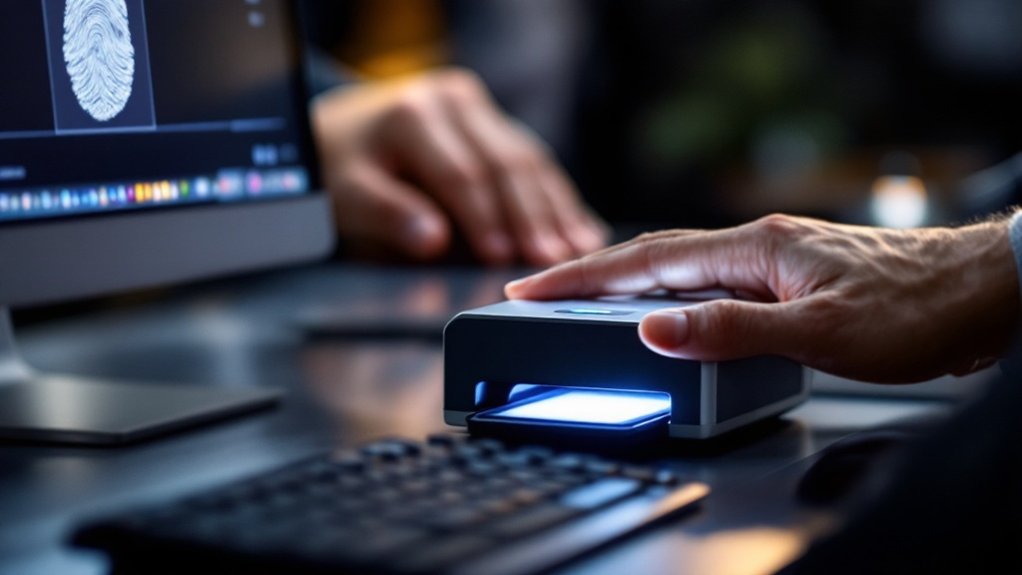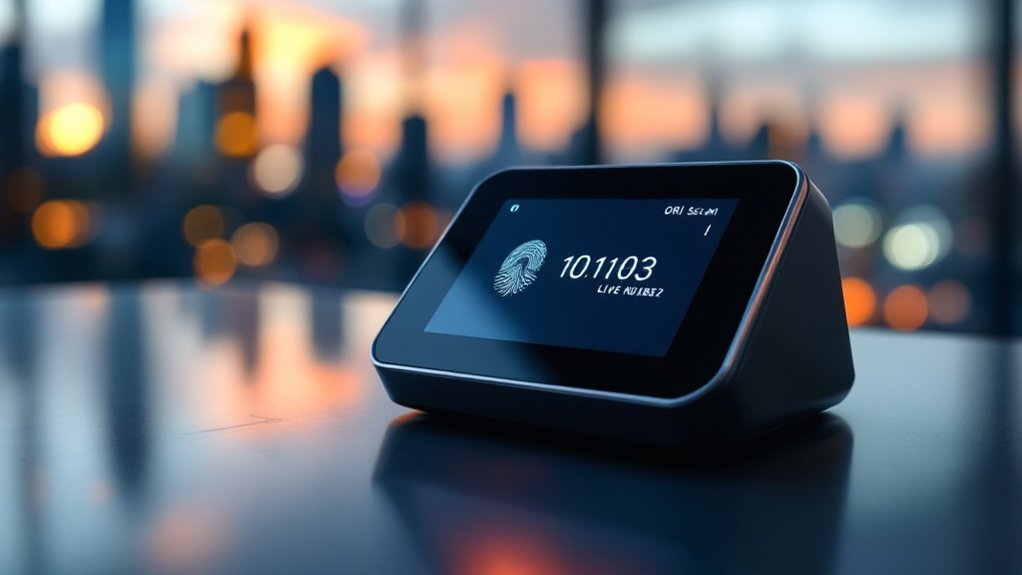When you undergo Live Scan fingerprinting, you’ll encounter an ORI number, which is a unique identifier assigned to agencies by the FBI or DOJ. It guarantees your fingerprint results are sent to the correct agency, preventing misrouting and delays. You’ll need to provide the accurate ORI to avoid processing issues. Precise ORI numbers are indispensable for background checks, and using them properly is imperative for job applications and licensing. You’ll find more details on how ORI numbers work in various contexts.
Definition and Purpose of ORI Numbers

When you’re dealing with Live Scan fingerprinting, you’ll often encounter an ORI number, which is a unique identifier assigned to agencies by the FBI or DOJ. This nine-character alphanumeric code guarantees that your fingerprint results are sent to the correct agency, preventing misrouting and delays. ORI numbers are essential for maintaining confidentiality and efficiency in the fingerprinting process.
The purpose of an ORI number is to identify authorized agencies and facilitate background checks, particularly Level 2 checks. It helps determine which statutes apply and where results should be sent, confirming compliance with legal requirements and timely processing of requests. Additionally, an ORI number ensures that agencies meet the established qualifying criteria for accessing criminal justice information, which is crucial for their operations.
Application and Registration Process
To apply for an ORI number, you’ll start by visiting the California Department of Justice (DOJ) website to initiate the process. You’ll need to submit specific documents, such as the appropriate application form, and guarantee your agency is eligible to receive an ORI number. Once your application is processed, which typically takes 4-6 weeks, the DOJ will assign a unique ORI number to your agency, which you must verify before using it for Live Scan services. If you have not received a response after this period, you should contact the DOJ’s ORI department by calling the non-automated line at (916) 227-7332 for further assistance.
Application and Registration Process
The Live Scan fingerprinting process starts with preparation, where you collect the necessary forms and information, including the ORI number, from the requesting agency. Ensuring the correct ORI and applicant type on the form is indispensable to avoid delays and misrouting of results. You then schedule an appointment at a Live Scan facility, where your identification is verified, and your personal details are inputted into the system. Your fingerprints are captured electronically and transmitted to the relevant agency for processing.
During the registration process, it is vital to verify all details with the requesting agency to avoid errors. Common mistakes include incomplete forms, incorrect applicant types, and lack of verification, which can lead to delays or additional costs. The ORI number serves as a critical identifier, ensuring that only authorized agencies can submit fingerprints for Live Scan Service, which involves using an ORI number to track and manage requests effectively.
Apply for ORI
Applying for an ORI number is a critical step for organizations that need to conduct Live Scan fingerprinting in California. You must apply through the California Department of Justice (DOJ) to obtain an ORI, which is required for accessing the Live Scan system. This process can be facilitated by services like Uncommon Business Services. As of January 1, 2022, certain organizations, such as churches and youth service groups, are legally required to have an ORI for fingerprinting purposes. Verify that your ORI is correctly registered with the DOJ to avoid any issues during the background check process.
DOJ Assignment
When you’re ready to obtain an ORI number, you’ll need to go through the California Department of Justice (DOJ). The application process involves submitting a request to your state’s CJIS Systems Officer with supporting documentation, such as statutory authority and budget details. This documentation must demonstrate your agency’s criminal justice authority and duties.
Once submitted, the request is reviewed by the CSO and then forwarded to the FBI CJIS Division for approval. This process typically takes several weeks. ORIs are essential for identifying your agency in transactions involving criminal justice information and ensuring access is restricted based on your agency’s duties.
Importance of Accuracy in ORI Numbers

Accurate ORI numbers are essential for ensuring that your Live Scan fingerprinting process runs smoothly. They prevent delays by ensuring results are sent to the right agency, reducing the need for resubmissions and saving time. Correct ORI usage also maintains confidentiality by sending sensitive information to the appropriate agency. This accuracy helps manage costs by avoiding additional fees and administrative burdens. Furthermore, accurate ORI numbers are crucial in background checks that involve fingerprint analysis, which is a key component in verifying an individual’s criminal history and ensuring the integrity of the process.
Common Mistakes and Solutions in ORI Submission
When submitting your Live Scan fingerprinting application, you’ll want to avoid common mistakes that can lead to delays or rejections. Incorrectly entering your ORI number or using outdated forms are errors that can cause significant issues, including misrouting of results and additional costs for resubmission. To prevent these problems, you should verify your ORI number with the requesting agency, guarantee you’re using the correct forms, and double-check all details before submission.
Common Mistakes and Solutions
Several common mistakes can occur during the ORI submission process for Live Scan fingerprinting, each with significant consequences. Incorrect ORI numbers can lead to delays or rejection of background checks, as they guarantee results are sent to the right agency. Incomplete or incorrect paperwork is another issue, causing processing delays or rejections if forms are not accurately filled out. Poor fingerprint quality due to dry skin or improper techniques can also require resubmission. To avoid these issues, verify your ORI with the requesting agency, secure accurate paperwork, and prepare your hands for fingerprinting by moisturizing them beforehand. Additionally, ensuring that the correct ORI number is used is crucial, especially since it often includes specific agency abbreviations like AHCA or DCF, which are embedded in the code to direct the background check results to the appropriate authority.
Blank Fields
Leaving blank fields in the ORI submission process for Live Scan fingerprinting can lead to significant complications, including delays or outright rejection of your background check. This is because the ORI number guarantees that your results are sent to the correct agency, and missing this information can cause misrouting. To avoid these issues, it’s vital to verify the ORI code with the requesting organization before submission.
To prevent blank fields, prepare all necessary information before your appointment and review the form thoroughly. Utilize online tools to verify ORI numbers if needed. Clear communication with the requesting agency is also essential to guarantee accuracy and avoid additional costs due to resubmission requirements. Ensuring the accuracy of the ORI number is crucial, as it serves as a unique identifier that directs the results to the appropriate department, ensuring a smooth and efficient background check process.
Outdated Forms
Using outdated forms during the Live Scan fingerprinting process can lead to significant complications, as these forms may not include the latest required fields or formats. This can result in delays or rejections due to missing or incorrect information. To avoid these issues, guarantee you use current forms that comply with the latest regulations.
To prevent mistakes, verify the ORI number to guarantee it matches the requesting agency. Provide proper training for staff on correct fingerprinting techniques to avoid sequence errors. Regularly update LiveScan machine tables to prevent transmission data errors. Clear instructions and quality control measures can also help guarantee good print quality and correct sequence, reducing the risk of rejections.
Examples of ORI Codes and Their Uses

When you’re preparing for Live Scan fingerprinting, understanding the specific ORI codes and their applications is critical. Each ORI code is unique and serves a particular purpose. For instance, IHSS Care Providers use A1934, while Registered Nurses use A0391, and Insurance Licenses use A0042. The Agency of Health Care Administration (AHCA) uses EAHCA020Z, and the Department of Children and Families, General (DCF General) uses EDCFGN10Z. These codes guarantee that your background check results are sent to the correct agency, which is imperative for job applications, licensing requirements, legal matters, security clearances, and volunteer background checks.
State-Specific Requirements for ORI Numbers**
State-specific requirements for ORI numbers vary considerably, reflecting the unique legal and administrative frameworks of each jurisdiction. In Florida, ORI numbers often start with “FL” followed by 7 digits, sometimes ending in “Z.” California assigns ORI numbers through the DOJ for access to the Live Scan system. Illinois restricts ORI access to criminal justice agencies as defined by federal regulations. Tribal agencies must demonstrate legal authority to access criminal justice information for ORI assignment. Each state’s approach guarantees that ORI numbers accurately route background check results to the correct agencies, maintaining compliance with local regulations.
Conclusion
As you navigate the world of Live Scan fingerprinting, remember that your ORI number is the key that opens the door to the right agency. It’s a pivotal identifier that guarantees your fingerprints are sent to the correct state department. Precision is essential; a single misstep can throw a wrench into the process. Double-check your ORI to avoid delays, and you’ll be sailing smoothly through the background check waters.

